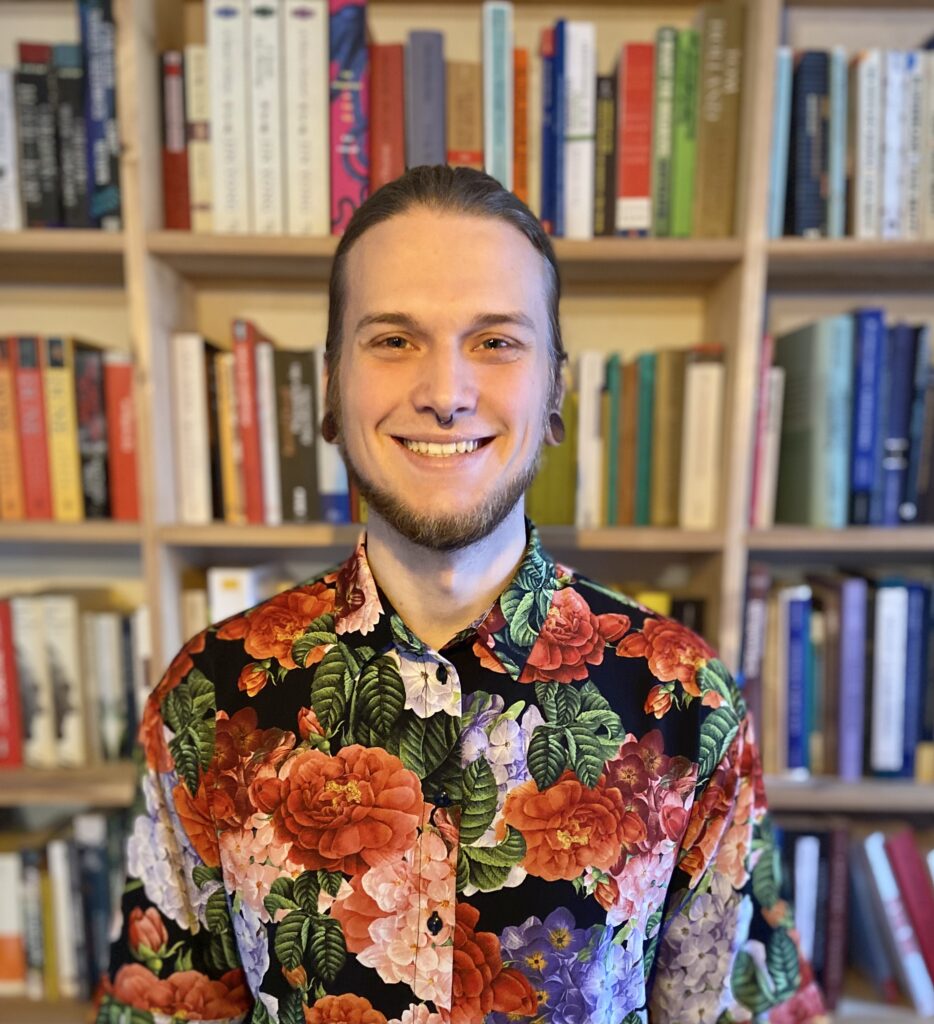
Jannes Thode
Research Fellow
Email:
jannes.thode[at]zmo.de
Address:
Kirchweg 33
14129 Berlin
Germany
Career
After studying M.A. Philosophy and B.A. Regional Studies Asia/Africa at the Humboldt-Universität zu Berlin and working as a student assistant for the Chair of ‘Cultures and Societies of South Asia’ and the MIDA project, I have been working as a research fellow for the MIDA project since April 2024. This includes maintaining the website, organising workshops and conferences, as well as editorial work on the publication of Archival Reflexicon articles and thematic resources. Within the project I am interested in the relationship between affect, atmosphere and power in archives.
In addition, I am researching the relationship between affect and violence in colonial Bengal after 1756 as part of my dissertation project, which began in July 2024. I would like to explore this relationship using the concept of an atmosphere of violence in order to shift the focus from warlike conflicts to everyday forms of violence or even a general tension that favoured violence.
Dissertation: State of Tranquillity? Affect, Atmosphere and Violence in Early Colonial Bengal
My dissertation aims to enrich the current research on the nexus of affect, anxiety and violence in colonial India. I seek to answer the questions of how different affects were entangled in early colonial Bengal, how these affects were lived and materialised in the socio-physical space, and how these materialised affects enabled and facilitated the use of violence. Through these questions, I hope not only to offer a corrective to the romanticised historical accounts of the British Empire, but also to contribute to the ongoing debate on colonial violence by demonstrating the importance of atmospheric practices as preconditions for violent action.
I explore the nexus in the beginning of colonial Bengal, from 1756 to 1793, when the East India Company rose from a trading company to become the local ruler of Bengal. This ascendancy sparked debates about sovereignty, taxation, or jurisprudence and changed the relationship between the British and the local population. This was accompanied by an affective reorganisation characterised by a slow shift from a fluid and interactive relationship between the Company officials and local intermediaries to a more distant, sceptical, suspicious and racialised one. Although this transitional and transformative period has been extensively researched, the relationship between affect and violence has been understudied.
During this period, I will first seek a deeper understanding of the overall affective landscape of the British and how it has changed over these years, disentangling the cluster of anxiety, fear, and angst and understanding their connections with other affects. Rather than focusing on one affect or one social group, I analyse the affective landscape as multi-layered, with different affects conflicting or converging, dampening or amplifying each other. For example, the anxious state of generals, constantly anticipating an unknown and diffuse threat, is fundamentally different from that of civil servants struggling with sense-making. Moreover, fear and anxiety as affects are not easily separable from other affects such as love, affection or sadness. Only this complex of different, intermixed affects, I argue, can adequately capture the violent nature of the British Empire in India.
Secondly, I focus on affect as a relation between bodies and things that inhabit and shape socio-physical space. While the literature on anxiety tends to focus on discursive practices such as media coverage of events and their framing, I pay attention to spatial practices and how affect is embedded in physical space. Through the notion of atmosphere, I trace the physical materialisations of affect and how the affective lives of individuals are both expressed through and shaped by the spaces they inhabit. Architecture or spatial rituals are then seen as affective practices that create and change an atmosphere. The British created or appropriated specific spaces and rituals in order to feel at home or to create an atmosphere of security and homeliness.
Finally, I want to consider how British atmospheric practices created the conditions for colonial violence to flourish in everyday interactions as well as in extraordinary excesses. I argue that violence is enabled by the change of atmosphere. By shaping the socio-physical space, the British created an atmosphere of tension that facilitated violence. The practices they used to reduce or counteract their anxiety were always already accompanied by a confrontation with that anxiety thereby reinforcing it. By attempting to create British spaces in a foreign place, the strangeness of that place was made all the more striking and intimidating, while at the same time their display of power reassured the British subjects, lowering the threshold for the exercise of violence.
Education
since 2024 Doctoral Candidate, Humboldt-Universität zu Berlin
Focus Area: Early Colonial Bengal, Affect, Violence, Atmosphere
Working Title: State of Tranquillity? Affect, Atmosphere and Violence in Early Colonial Bengal
2019 – 2024 B.A. Area Studies Asia/Africa, Humboldt-Universität zu Berlin
Focus Area: South Asia, Colonial India
2018 – 2023 M.A. Philosophy, Humboldt-Universität zu Berlin
Focus Area: Marxism, Theories of Ideology, Social Epistemology, Affect
Thesis: Hoping Subjects / Hoffende Subjekte: Althusser und der Hoffnungsdiskurs der analytischen Philosophie
2015 – 2018 B.A. Philosophy & Social Sciences, Humboldt-Universität zu Berlin
Focus Area: Ontology, Metaphysics
Thesis: Why There Are No Artworks, but We Still Can Talk as if There Were: A Fictionalistic Approach in the Ontology of Artworks
Occupational Career
since 2024 Research Fellow / DFG-Funded Long-Term Project „Das Moderne Indien in deutschen Archiven (Modern India in German Archives)“, Leibniz-Zentrum Moderner Orient, Berlin
2022 – 2024 Student Assistant / DFG-Funded Long-Term Project „Das Moderne Indien in deutschen Archiven (Modern India in German Archives)“, Humboldt-Universität zu Berlin, Berlin
2021 – 2024 Student Assistant / Chair of „Kulturen und Gesellschaften Südasiens“, Department of South Asian Studies, IAAW, Humboldt-Universität zu Berlin, Berlin
Teaching Experience
Winter Term 2023/2024 B.A. Course: Pulse of the Nation: Perspectives on Nation and Nationalism in South Asia, Humboldt-Universität zu Berlin, Berlin
Publications
with Paula Schnabel: “Archival Silences and Indo-German Entanglements: Ways of Uncovering Hidden Voices”. The Bodleian Conveyor, 20.11.2024. Available at https://blogs.bodleian.ox.ac.uk/theconveyor/archival-silences-and-indo-german-entanglements-ways-of-uncovering-hidden-voices/.
